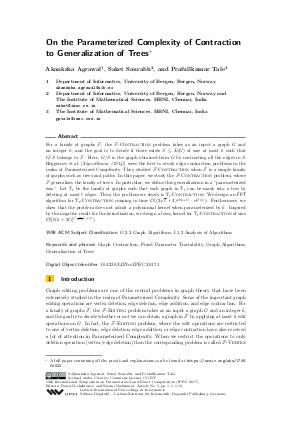On the Parameterized Complexity of Contraction to Generalization of Trees
Authors Akanksha Agrawal, Saket Saurabh, Prafullkumar Tale
-
Part of:
Volume:
12th International Symposium on Parameterized and Exact Computation (IPEC 2017)
Part of: Series: Leibniz International Proceedings in Informatics (LIPIcs)
Part of: Conference: International Symposium on Parameterized and Exact Computation (IPEC) - License:
 Creative Commons Attribution 3.0 Unported license
Creative Commons Attribution 3.0 Unported license
- Publication Date: 2018-03-02
File

PDF
LIPIcs.IPEC.2017.1.pdf
- Filesize: 0.52 MB
- 12 pages
Document Identifiers
Subject Classification
Keywords
- Graph Contraction
- Fixed Parameter Tractability
- Graph Algorithms
- Generalization of Trees
Metrics
- Access Statistics
-
Total Accesses (updated on a weekly basis)
0Document
0Metadata
Abstract
For a family of graphs F, the F-Contraction problem takes as an input a graph G and an integer k, and the goal is to decide if there exists S \subseteq E(G) of size at most k such that G/S belongs to F. Here, G/S is the graph obtained from G by contracting all the edges in S. Heggernes et al.[Algorithmica (2014)] were the first to study edge contraction problems in the realm of Parameterized Complexity. They studied \cal F-Contraction when F is a simple family of graphs such as trees and paths. In this paper, we study the F-Contraction problem, where F generalizes the family of trees. In particular, we define this generalization in a "parameterized way". Let T_\ell be the family of graphs such that each graph in T_\ell can be made into a tree by deleting at most \ell edges. Thus, the problem we study is T_\ell-Contraction. We design an FPT algorithm for T_\ell-Contraction running in time O((\ncol)^{O(k + \ell)} * n^{O(1)}). Furthermore, we show that the problem does not admit a polynomial kernel when parameterized by k. Inspired by the negative result for the kernelization, we design a lossy kernel for T_\ell-Contraction of size O([k(k + 2\ell)] ^{(\lceil {\frac{\alpha}{\alpha-1}\rceil + 1)}}).
Cite As Get BibTex
Akanksha Agrawal, Saket Saurabh, and Prafullkumar Tale. On the Parameterized Complexity of Contraction to Generalization of Trees. In 12th International Symposium on Parameterized and Exact Computation (IPEC 2017). Leibniz International Proceedings in Informatics (LIPIcs), Volume 89, pp. 1:1-1:12, Schloss Dagstuhl – Leibniz-Zentrum für Informatik (2018)
https://doi.org/10.4230/LIPIcs.IPEC.2017.1
BibTex
@InProceedings{agrawal_et_al:LIPIcs.IPEC.2017.1,
author = {Agrawal, Akanksha and Saurabh, Saket and Tale, Prafullkumar},
title = {{On the Parameterized Complexity of Contraction to Generalization of Trees}},
booktitle = {12th International Symposium on Parameterized and Exact Computation (IPEC 2017)},
pages = {1:1--1:12},
series = {Leibniz International Proceedings in Informatics (LIPIcs)},
ISBN = {978-3-95977-051-4},
ISSN = {1868-8969},
year = {2018},
volume = {89},
editor = {Lokshtanov, Daniel and Nishimura, Naomi},
publisher = {Schloss Dagstuhl -- Leibniz-Zentrum f{\"u}r Informatik},
address = {Dagstuhl, Germany},
URL = {https://drops.dagstuhl.de/entities/document/10.4230/LIPIcs.IPEC.2017.1},
URN = {urn:nbn:de:0030-drops-85446},
doi = {10.4230/LIPIcs.IPEC.2017.1},
annote = {Keywords: Graph Contraction, Fixed Parameter Tractability, Graph Algorithms, Generalization of Trees}
}
Author Details
References
-
Akanksha Agrawal, Lawqueen Kanesh, Saket Saurabh, and Prafullkumar Tale. Paths to trees and cacti. In CIAC, pages 31-42, 2017.

-
Akanksha Agrawal, Daniel Lokshtanov, Saket Saurabh, and Meirav Zehavi. Split contraction: The untold story. In STACS, volume 66 of LIPIcs, pages 5:1-5:14, 2017.

-
Takao Asano and Tomio Hirata. Edge-Contraction Problems. Journal of Computer and System Sciences, 26(2):197-208, 1983.

-
Rémy Belmonte, Petr A. Golovach, Pim Hof, and Daniël Paulusma. Parameterized complexity of three edge contraction problems with degree constraints. Acta Informatica, 51(7):473-497, 2014.

-
Leizhen Cai. Fixed-parameter tractability of graph modification problems for hereditary properties. Information Processing Letters, 58(4):171-176, 1996.

-
Leizhen Cai and Chengwei Guo. Contracting few edges to remove forbidden induced subgraphs. In IPEC, pages 97-109, 2013.

-
Marek Cygan. Deterministic parameterized connected vertex cover. In Scandinavian Workshop on Algorithm Theory, pages 95-106. Springer, 2012.

-
Marek Cygan, Fedor V. Fomin, Lukasz Kowalik, Daniel Lokshtanov, Dániel Marx, Marcin Pilipczuk, Michal Pilipczuk, and Saket Saurabh. Parameterized Algorithms. Springer, 2015.

-
Marek Cygan, Jesper Nederlof, Marcin Pilipczuk, Michal Pilipczuk, Johan M. M. van Rooij, and Jakub Onufry Wojtaszczyk. Solving connectivity problems parameterized by treewidth in single exponential time. In FOCS, pages 150-159, 2011.

-
Reinhard Diestel. Graph Theory, 4th Edition, volume 173 of Graduate texts in mathematics. Springer, 2012.

-
Rod G. Downey and Michael R. Fellows. Parameterized complexity. Springer-Verlag, 1997.

-
Rod G. Downey and Michael R. Fellows. Fundamentals of Parameterized complexity. Springer-Verlag, 2013.

-
Jörg Flum and Martin Grohe. Parameterized Complexity Theory. Texts in Theoretical Computer Science. An EATCS Series. Springer, 2006.

-
Petr A. Golovach, Pim van 't Hof, and Daniel Paulusma. Obtaining planarity by contracting few edges. Theoretical Computer Science, 476:38-46, 2013.

-
Sylvain Guillemot and Dániel Marx. A faster FPT algorithm for bipartite contraction. Inf. Process. Lett., 113(22-24):906-912, 2013.

-
Pinar Heggernes, Pim van 't Hof, Daniel Lokshtanov, and Christophe Paul. Obtaining a bipartite graph by contracting few edges. SIAM Journal on Discrete Mathematics, 27(4):2143-2156, 2013.

-
Pinar Heggernes, Pim van 't Hof, Benjamin Lévêque, Daniel Lokshtanov, and Christophe Paul. Contracting graphs to paths and trees. Algorithmica, 68(1):109-132, 2014.

-
Wenjun Li, Qilong Feng, Jianer Chen, and Shuai Hu. Improved kernel results for some FPT problems based on simple observations. Theor. Comput. Sci., 657:20-27, 2017.

-
Daniel Lokshtanov, Neeldhara Misra, and Saket Saurabh. On the hardness of eliminating small induced subgraphs by contracting edges. In IPEC, pages 243-254, 2013.

-
Moni Naor, Leonard J Schulman, and Aravind Srinivasan. Splitters and near-optimal derandomization. In FOCS, pages 182-191. IEEE, 1995.

-
Rolf Niedermeier. Invitation to fixed-parameter algorithms. Oxford Lecture Series in Mathematics and Its Applications. Oxford University Press, 2006.

-
Toshimasa Watanabe, Tadashi Ae, and Akira Nakamura. On the removal of forbidden graphs by edge-deletion or by edge-contraction. Discrete Applied Mathematics, 3(2):151-153, 1981.

-
Toshimasa Watanabe, Tadashi Ae, and Akira Nakamura. On the NP-hardness of edge-deletion and-contraction problems. Discrete Applied Mathematics, 6(1):63-78, 1983.

